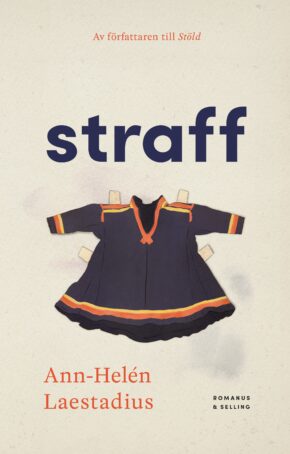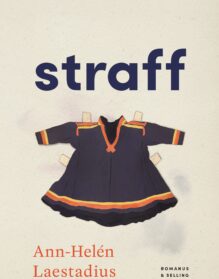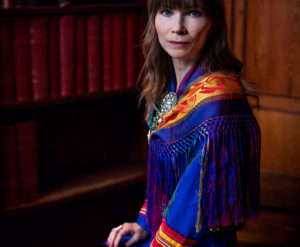
Up until the 1960’s, the Swedish state forced children of Sámi reindeer herders to move away from home at age seven to attend so-called nomad schools. At these boarding schools, children were systematically forbidden from speaking their own language and were taught to be ashamed of their heritage and culture. Punished is their story.
When Else-Maj first arrives at school, she doesn’t speak a word of Swedish and is terrified and confused. Her older siblings have warned her not to cross the Housemother. Dubbed The Witch by the children, Rita Olsson is brutal in her ways, quick to discipline the children with sadistic cruelty.
At the school are also Jon-Ante, Marge, Nilsa, and Anne-Risten. They all have different ways of coping with their homesickness and the physical and psychological violence they endure. Little Jon-Ante has it worst, as he not only falls victim to Housemother’s wrath, but also becomes the chosen punching bag of the older boys, with Nilsa as ringleader. The children have one solace: the nursemaid Anna who is always kind and quietly whispers in Sámi to them when Housemother doesn’t hear. But when Anna oversteps her bounds in an effort to save an ill child, she is banished from the school. Back home, the children’s parents are unaware of how their little ones are being treated, and those who try to speak up are met with silence and disbelief from the authorities.
Some thirty years later, the five children have chosen different paths in order to survive – or at least try to forget. Else-Maj is strong in her Sámi identity, but the trauma of her childhood has made her unable to connect emotionally with her own children, and she has turned to religion for comfort. Anne-Risten now only goes by Anne, cautiously hiding her heritage and speaking only Swedish to her little ones. Nilsa has become a reindeer herder like his father before him, but he continues to harbor an explosive anger – and the violence to match. Jon-Ante has moved away and disconnected from the Sámi community because he cannot bear to face the tormenters of his youth, while his crooked pinky finger is a permanent reminder of Housemother’s evil. And then there’s Marge who has just adopted a six-year-old girl from another part of the world – but she can’t help questioning if it’s right of her to uproot a child from their home and culture.
Then suddenly, Housemother Rita reappears amongst them. Now an old, frail woman with God on her side, she has moved back into town. The five scarred children who are now grown up have neither forgotten nor forgiven her, and her reappearance ignites long-buried thoughts of revenge.
Punished, the highly anticipated follow up novel to the runaway best-seller Stolen by Ann-Helén Laestadius, is a searing novel about trauma, memory, love, and loss, written in taut prose and vibrating with righteous rage. Told in alternate chapters cutting between the 1950’s and 80’s, and based on historical accounts of documented injustices, Punished exposes the Swedish state’s greatest betrayal towards the Sámi: the nomad school system that shattered generations and caused loss of language, shame, and broken family ties.
Extra Materials
Reviews
“Punished is not only a well-written novel, but also an essential history lesson, the story of what the Sámi have been subjected to over the years. […] Punished becomes a powerful social depiction of how society has changed from a Sámi point of view. Some things really change, some things don’t change at all. […] With Stolen and Punished, Ann-Helén Laestadius writes herself into the Swedish proletarian literature tradition, the story is factual and concrete rather than experimental in its form. […] the straightforward style is important, because it’s the Sámi that is the true language, crucial for the identity. Swedish is just the forced upon official language that is never enough. Ironically enough, in a novel written in Swedish, Ann-Helén Laestadius succeeds in portraying precisely that tension by repeatedly expressing the grief and longing for the own language, the clothes, the food, the culture. That’s what the real world is.”
Lotta Olsson, Dagens Nyheter (SE)
“It is as though my own body is reading Ann-Helén Laestadius’s new novel, Punished. And it really, really hurts. She portrays what happened in a so-called Nomad school for Sámi children in the north of Sweden in the fifties, and it is the child’s gaze and emotions that provide the reader with the alphabet. […] But Laestadius has not written a political pamphlet, but an utterly subtle psychological novel that evokes far stronger emotions than any debate book ever would. We follow a number of school children for a few years in the fifties and a few years in the eighties. This approach is very effective because, as a reader, I am so clearly confronted with the lifelong damage those children sustained from the institutionalized racism at the nomad school. […] The title Punished is ambiguous, but I won’t reveal why. Anyway: if I could jojk I would do so over an incredibly gripping and enlightening story.”
Göran Greider, Aftonbladet (SE)
“For a few days I have been completely immersed into the life of a nomad school in the 1950s through the well-written novel Punished by Ann-Helén Laestadius. People usually talk about books for children in the bookworm age, but this is a novel for adults in the bookworm age. With great precision and steady rhythm, she draws her protagonists, a group of defenceless Sámi children. […] Just like with the first book in the Sápmi trilogy, Stolen, Laestadius pedagogical ambition is clear. But someone has to do the job. And this novel is even more grand. The author sensitively portrays how these unfortunate children tackle their shared history as adults. How they distance themselves from one another. Start to drink. Shut down from a mixture of shame and guilt. Get overly anxious.”
Gunilla Brodrej, Expressen (SE)
“A page turner about revenge. You have to read it in one sitting. […] A collective novel filled with life that has long been held back; immersive, brutal, and wistful. […] There is snow, sun, and darkness, and it is incredibly powerful.”
SVT Kulturnyheterna (SE)
“In the novel Punished, Ann-Helén Laestadius takes the reader to the Soppero area from the early 1950s to the mid-1980s. Throughout the story we follow five classmates, each one clearly carved out as a person with their own qualities. The dialogue in particular has a wonderful flow. A moving and touching story that goes straight to the heart.”
Norrländska Socialdemokraten (SE)
“Ann-Helén Laestadius’s novel Punished – a text that vibrates with emotion – is a rich tale that provides knowledge, powerful drama and, best of all: all of these Sámi words and expressions. Most of all I want to thank the author. Ollu giitu! Thank you so much.”
Västerbottens-Kuriren (SE)
“Punished is a novel about children who get hurt, but equally a story about relationships, a book about adults, and a piece of Sámi cultural history sharply portrayed through strong, empathetic character portrayals. […] Punished is a deeply moving novel – read it!”
Femina (SE)
“It’s refreshing to read the second part in Ann-Helén Laestadius’s important and engaging trilogy about Sápmi. The first book Stolen became a Swedish bestseller and an international success, but Punished doesn’t follow in its tracks, but paves the way for new ones. […] It doesn’t take any shortcuts from trauma to healing, but rather sees the pain and acknowledges the damage. Admittedly, the author musters all her strength into creating some concluding glimmers of light, but the lasting impression of Punished is darkness. After all of Laestadius’s novels about struggle big and small, about persistence despite powerlessness, it feels refreshing and liberating with a work that remains in sadness.”
Abram Martina Lowden, Svenska Dagbladet (SE)
“Punished is unforgettably horrible and at times nearly an unbearable testimony. I read it slowly as I had to catch my breath and gather my strength for each chapter. […] Laestadius has, just like in her previous novel Stolen, an incredibly unique ability to bring characters and emotions to life, and allow the flow of smells, tastes, and thoughts to wash over the pages like a mighty northern reindeer herd borne by the author’s pathos and deep indignation over the injustices that have been committed against the Sámi people. It’s a tough, but striking and important, read.”
Alingsås Tidning (SE)
“Punished by Ann-Helén Laestadius, a book I had great expectations for that managed to fulfil them all. It is a tough read, but also important. Just as in her first book, Stolen, the author writes about Sámi history. Here, it is about how children of Sámi reindeer herders were forced to go to nomad schools, were forbidden from speaking their own language, and were extremely badly treated by their housemother.”
Barometern (SE)
“Just as in Stolen, her debut for an adult audience, Ann-Helén Laestadius’s writes in a natural and effective prose, with a clear mission: We have to talk about this! And yes, we do! We have to talk about human rights, about hatred towards indigenous groups, and what’s better than using fiction’s possibilities for portraying something that cannot be depicted through dry reports.”
Smålandsposten (SE)
“Punished is a novel about many things, about countless variations of Sámi vulnerability and the shame and culture of silence that follows in its wake, but above all I read it as a novel about language and language loss, and what consequences it later brings. It becomes most potent in the story of Marge, who, after adopting a daughter from Colombia, struggles with the feeling of having repeated history.”
Tidningen Vi (SE)
“Ann-Helén Laestadius has written a collective novel, and she takes her time to set her pieces. […] Once the pieces are in position and the game in Punished begins, as a reader you’re captivated and moved by the fates of the characters Ann-Helén portrays. Above all it’s the depiction of the 1980’s that is the most engaging, where the author with painful clarity shows how the abuse is so deeply rooted within these individuals that it has become part of their identity. […] Stolen was driven by a fury, and although Punished is a quieter journey, the fury lies beneath the surface, boiling up every now and then as if from a hot spring, and there’s constantly this beating heart that energizes the novel.”
Gefle Dagblad (SE)
“Laestadius portrays an important part of our country’s history that has been forgotten in history class. Namely, how we’ve treated the Sámi and how it became a trauma that still lives on. In Punished we follow a number of people who were forced to go to nomad schools as children, both their lives back then and as adults. As seven-year-olds they were forced to leave the safety of their villages and live at the school under the strict housemother – crying, jojk, the Sámi language, and everything that was a reminder of their background was forbidden. How does that affect a person, and a whole people? […] Laestadius storytelling is dramaturgically powerful and even though I at times read it with a lump in my throat, I cannot stop reading. This really is important, and a must-read.”
Barometern (SE)
“Punished is a chillingly beautiful story written by Ann-Helén Laestadius and is based on real events.”
Aftonbladet (SE)
“Could this really happen in the nomad schools? Yes, it is now portrayed in Punished. […] The reality is upsetting. It has improved in our time, but racism against Sámi still persists.”
Gotlands Allehanda (SE)
“All I can do is to express my deepest gratitude for the possibility to read these invaluable testimonies.”
Uppsala Nya Tidning (SE)
“It hurts to read Punished. At the same time, it’s incredibly hard to let go off. As the book nears its end, I notice how I take more and more pauses, just to make the book last a little bit longer. And once it ended, I felt empty, and yet so whole. Perhaps that is the best of feelings, when a book is finished.”
Bläddrat (SE)
“Even though the story takes the form of a novel, it’s not far from reality. […] Punished is a novel about distance, about longing, and about detachment. About being separated from, and perhaps never being able to find the way back, to your family, culture, and history. […] Perhaps we need the help of fiction from time to time to understand the relentless tragedy that these life stories bear witness too.”
Nu (SE)

